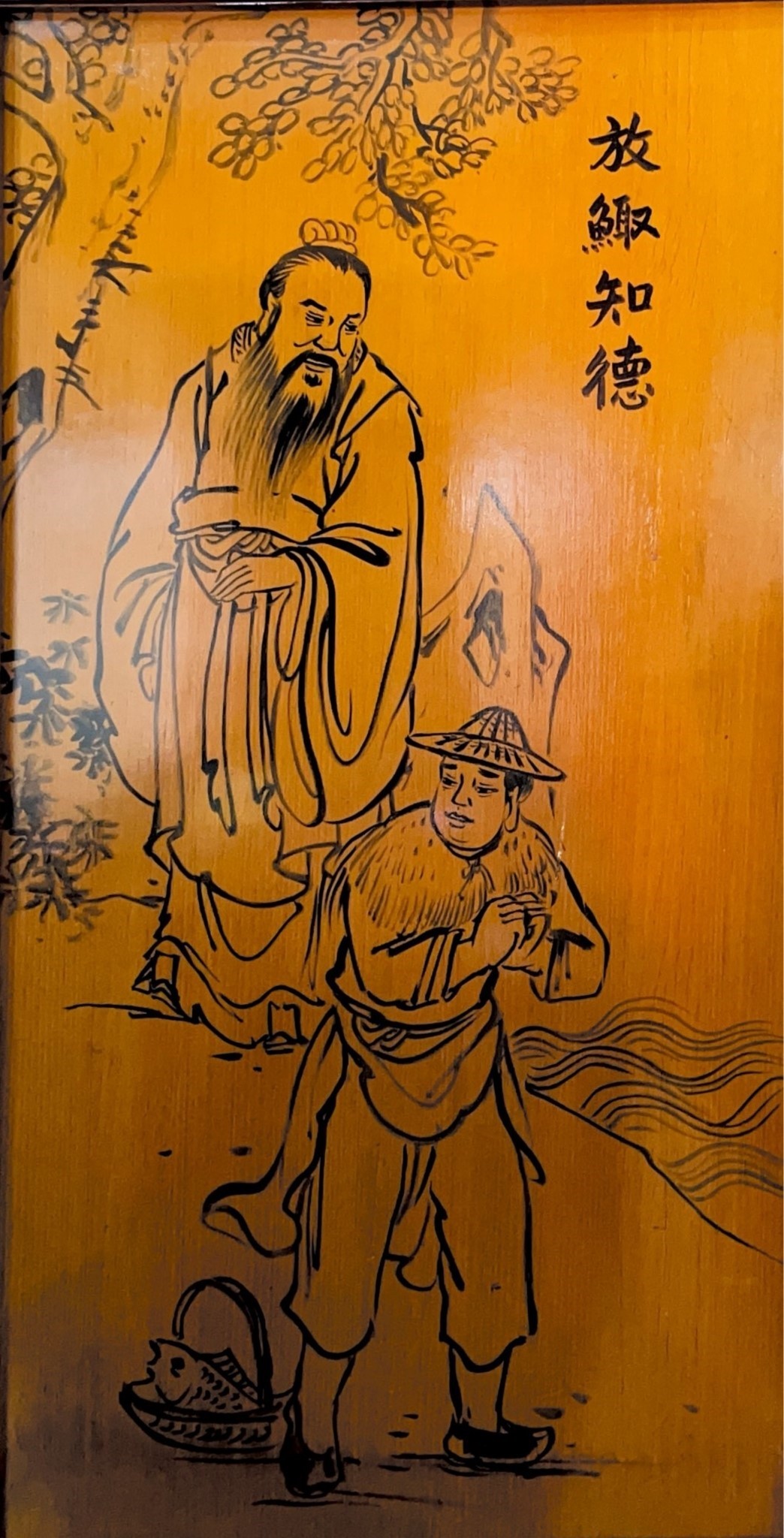Releasing Small Fish as a Virtuous Deed
文、圖 / 歐修梅

故事出處:《孔子家語.屈節解》
The story comes from Confucius’ Family Sayings: Explanation of Modesty
孔子弟子有宓子賤者,仕於魯,為單父宰。三年,孔子使巫馬期往觀政焉。
巫馬期陰免衣,衣弊裘,入單父界。
見夜漁者,得魚輒舍之。巫馬期問焉,曰:「凡漁者為得,何以得魚即舍之?」
漁者曰:「魚之大者名為䲖,吾大夫愛之;其小者名鱦,吾大夫欲長之。是以得二者輒舍之。」
巫馬期返以告孔子曰:「宓子之德至,使民闇行若有嚴刑於旁。敢問宓子何行而得於是?」
孔子曰:「吾嘗與之言曰:『誠於此者,刑乎彼。』宓子行此術於單父也。」
One of Confucius’ disciples, Mi Zijian, held office in the State of Lu, presiding over Danfu. After three years, Confucius dispatched Wu Maqi to assess Mi’s administration.
Removing his usual garments at night for a weathered fur coat, Wu Maqi entered the precincts of Danfu.
There, he witnessed a fisherman who, under the cover of night, released every fish he had caught. Intrigued, Wu Maqi inquired, “Most fishermen retain the fish they capture. What compels you to set them free?”
The fisherman replied, “The larger fish, known as ‘chou,’ are cherished by our magistrate. The smaller ones, named ‘sheng,’ are intended by our magistrate to grow. Hence, I release both kinds whenever I catch them.”
Upon his return, Wu Maqi reported to Confucius, “The virtue of Mi Zijian is so widespread that his subjects act as though under stringent laws, even in secrecy. How has he achieved such influence?”
Confucius responded, “I once said to him, ‘Sincerity in one place manifests as if it were strict law in another.’ Mi Zijian has practiced this principle in Danfu.”
孔子有一個學生名為宓子賤,在魯國擔任管理單父邑的官員。宓子賤以敦厚之心,施行仁政,誠懇而忠信,百姓都受到他的感化。三年之後,孔子派遣另一位弟子巫馬期,去單父了解宓子賤的政績。
Confucius had a student named Mi Zijian, who served as an official managing the town of Danfu in the State of Lu. Mi Zijian governed with an honest mind, practicing benevolence with sincerity and loyalty, which deeply inspired townspeople. After three years, Confucius sent another disciple, Wu Maqi, to Danfu to learn about Mi Zijian’s achievements in governance.
巫馬期脫下官服,先暗地裡穿上破皮襖,易裝進入單父境內。巫馬期在當地看到夜間捕魚的人,那人補到了魚,卻又將魚放了。巫馬期覺得很奇怪,便問道:「所有捕魚的人,目的都是在得到魚,為什麽你明明補到魚,卻又把魚給放了呢?」捕魚的人說:「魚群中那些大一點的叫做「䲖」,是懷孕的鮑魚,我們的地方官宓子賤大夫很護生、疼惜它們;那些小一點的叫做「鱦」,我們的宓子賤大夫希望讓魚長大再捕捉,剛剛我所捕到就是這兩種魚,所以,就把它們都放了。」
Wu Maqi took off his official attire and, in secret, changed to a tattered leather coat before entering the land of Danfu. There, he saw a man fishing at night, who released the fish he had just caught. Wu Maqi was curious and asked, “Most people keep the fish they catch. Why did you release it at all?” The fisherman explained, “In a group of fish, the larger ones are called ‘chou,’ which means pregnant abalone, while the smaller ones are called ‘sheng.’ Our magistrate Mi Zijian is highly protective of wildlife and cherishes them. He wants us to catch only fully grown fish. The fish I caught fall into both categories, so I released them.”
巫馬期回去後,將所看到的情形告訴孔子,並且說:「宓子的德政,使百姓在暗地裡做事,都好像旁邊有著嚴明的刑法在監督自己,請問老師:宓子是怎麼能達到這個境界的呢?
After he returned, Wu Maqi reported everything he had seen to Confucius and said, “Mi Zijian’s virtuous governance is so effective that people feel they are under strict surveillance even when acting in secret. My master, how could he achieve this?”
孔子說:「我曾經跟子賤講過:『在此地表現出最大的真誠,一定可以在另外一處形成最好的典範。』子賤在單父推行的,就是這個辦法吧!」
Confucius replied, “I once told Zijian, ‘Uttermost sincerity demonstrated in one place will serve as the most exemplary model in another.’ I believe Zijian applied this principle in his governance in Danfu!”
此畫描繪的,就是巫馬期在單父看漁夫捕魚的這個故事。孔子曾經說過:「君子之德風,小人之德草。草上之風,必偃。」在上位者的德性就像風一樣,而百姓則像地上的草。當風吹過草地時,草便會跟著風的方向而動,風往哪兒吹,草就往哪裡倒。因此,孔子教導宓子賤要以真誠對待百姓,當宓子賤在眾人可見的地方真誠地實施仁政,那麼在眾人看不見的地方,例如夜裡的水邊,百姓就會做出足以為典範的行為,例如護生、尊重自然律則。
This painting depicts the story of Wu Maqi observing a fisherman catching fish in Danfu. Confucius once said, “The superior’s virtue is like the wind, and the inferior’s virtue is like grass. Wherever the wind blows, the grass bends.” The saying refers to the superior’s virtue as the wind and the inferior’s virtue as the grass in a field. When the wind blows across the grass, the grass moves in the direction of the wind. Wherever the wind blows, the grass bends in that direction. Therefore, Confucius taught Mi Zijian to treat people with sincerity. When Mi Zijian practiced benevolence with sincerity in places that can be monitored by all, in places that no one can see, such as waterfront at night, people will carry out exemplary deeds, such as protecting wildlife and respecting the laws of nature.
